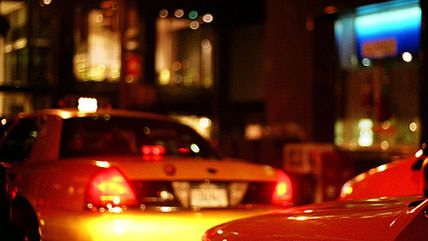Put the Taxi Cartel in the Rearview Mirror
21st-century technology and entrepreneurial ingenuity are opening up the market for hired cars.

If driving a taxi in Chicago is your dream job, have I got a deal for you. You get to fight traffic, deal with drunks and deadbeats, work long hours and breathe exhaust fumes nonstop. And I can get you into it for just $360,000.
That's what you can expect to pay for the city medallion required to operate a cab. First, though, you have to find someone who wants to sell: The number is currently fixed, and the city generally holds auctions only when it reclaims existing medallions.
If that actually sounds like a terrible deal, it is -- for aspiring drivers. But it's sweet for some people. In recent years, an investor who bought New York taxi medallions would have done far better than someone who put money into the stock market.
In Chicago, most medallions are owned by cab companies like Yellow and Checker, which rent them out to drivers. For the most part, the taxi companies got the hood ornaments cheap years ago. In 1991, medallions sold for about $28,000. In 2006, the price was less than $79,000.
The reason they cost so much is that the city's curbs on competition foster handsome returns. The number of medallions has been capped at the same level since 1997. By restricting the supply, the city assures the income of medallion owners -- at the expense of consumers and drivers.
But that venerable business model is in peril. Today, in Chicago and many other cities, the established cab industry has to contend with on-demand "ride-sharing" services like Uber, Lyft and Sidecar that let drivers and passengers opt out of the hyper-regulated, supply-starved taxi system.
Customers can use a smartphone app to request a ride, or order online. Someone with a private car and affiliated with one of the companies will show up, with the fare and tip charged to the user's credit card or PayPal account.
Though the price is often lower than what taxis charge, the services add surcharges during busy periods, which can greatly elevate the cost. But customers are notified of the boost in advance, so they can avoid it.
Critics call it price gouging. Economists call it market equilibrium. Higher fares bring more drivers out in rainstorms or on New Year's Eve to meet the demand. Passengers who prefer a lower fare can take a cab -- if they can find one.
The innovation has worked well enough for ride-sharing firms to attract plenty of customers. So Chicago Mayor Rahm Emanuel has proposed to accommodate them with regulations less stringent than those on cabs. They would have to do checks on drivers for criminal as well as traffic offenses, carry liability insurance and get vehicles inspected annually.
But the taxi industry sued, demanding that the city shut down the "Unlawful Transportation Providers." The industry claims it's looking out for the interests of poor and minority passengers, whom Lyft and Uber are not obligated to serve. Amid the crocodile tears, you might forget that cab companies are infamous for dodging that obligation.
One of my editors, who lives in a safe, middle-class, largely African-American neighborhood on the South Side, has never, in over 30 years, been able to get a taxi to come to her house. Uber says (though it does not document) that 40 percent of its Chicago trips begin or end in underserved areas.
The company had to apologize when The Chicago Tribune reported that one driver had a felony conviction for burglary. But taxi regulation isn't foolproof either. In 2005, a driver killed in a fight with a passenger was found to have a battery conviction that should have barred him from operating a Chicago cab. A 2012 Tribune investigation found the city consistently has failed to enforce laws to keep dangerous taxi drivers off the road.
At the heart of the opposition is naked self-interest, not consumer protection. Permitting competition, the lawsuit says, "threatens seriously to devalue more than 6,800 medallions currently in use in Chicago."
Yes, it does. Breaking up a cartel is bad for the cartel participants. Having pushed for and profited from a system that artificially limits the supply of cabs, the medallion owners now argue that it must be preserved for their benefit.
But 21st-century technology and entrepreneurial ingenuity have demonstrated the value of opening up the market for hired cars. The industry has had its way for decades. It's time to put consumers in the driver's seat.


Show Comments (41)